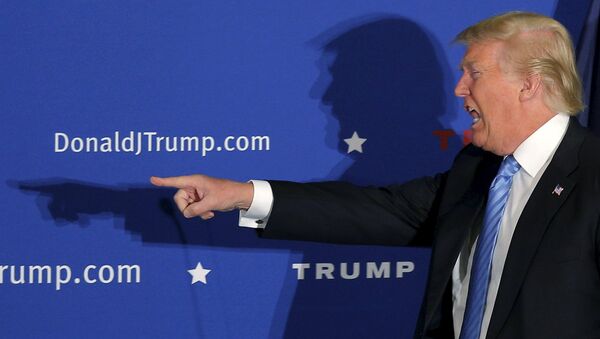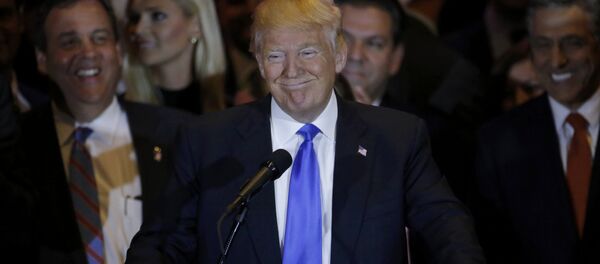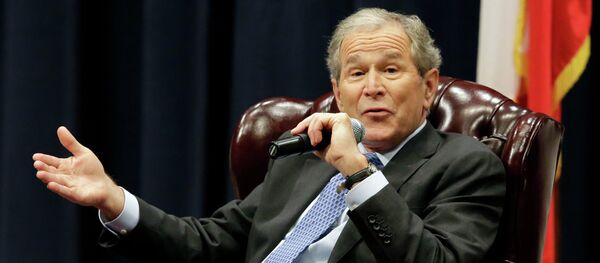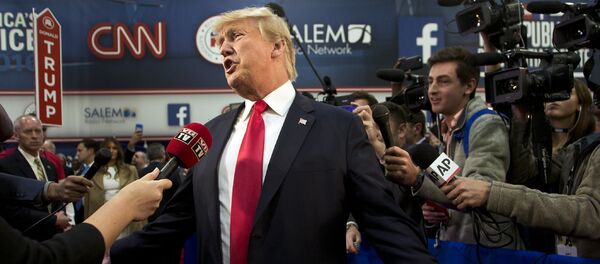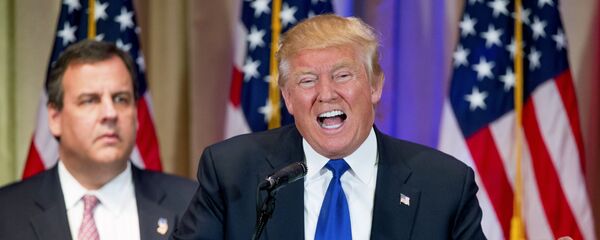After the billionaire won the primaries in Indiana, his Republican rival Senator from Texas Ted Cruz withdrew from the campaign. Later, Trump’s party fellow, John Kasich also suspended his campaign.
"If you’d told me a year ago that Trump would be the nominee, I’d have thought you were nuts," prominent US electoral analyst Nate Silver wrote.
Throughout last year, Silver could not believe Trump’s success. But in the end, the Republicans failed to propose to their voters a descent candidate to rival Trump.
Out of Control
One of the reasons behind Trump’s triumph is that in due time GOP leaders failed to see their electorate’s shift toward right-wing populist ideas.
The first signal was the creation of the so-called Tea Party movement within the Republican Party. The new platform united many ultraconservative groups, ranging from libertarians to far-right activists. Then anti-immigration and opponents of LGBT rights joined the movement.
"There is a party center that two decades ago would have been considered the bedrock right, and a new right that is off the old charts. And I have seen a GOP Congress in which the establishment, itself very conservative, has lost the battle to co-opt the Tea Party radicals, and itself has been largely co-opted or, at minimum, cowed by them," Norm Ornstein from the Brookings Institute wrote on the balance within the party.
First, populist ultraconservatives took control over Congress. Then, the number of their supporters among local activists and politicians began to grow rapidly.
"Trump is no fluke. Nor is he hijacking the Republican Party or the conservative movement, if there is such a thing. He is, rather, the party’s creation, its Frankenstein monster, brought to life by the party, fed by the party and now made strong enough to destroy its maker," Robert Kagan from the Brooking Institute wrote in February.
Going Against the System
In theory, any other anti-system politician could be in Trump’s place. For example, Ted Cruz once pretended to be against the Republican establishment. But Trump won the fight because of his flamboyant charisma of a successful businessman.
Trump is quite the opposite of Obama. The tycoon who made his wealth in real estate has been a tabloid and reality-show star for the last 30 years. He took the world of big politics by storm.
"Whether you worship or despise Trump, the man has no strings. Nobody controls Trump. Not the Republican Party, not the media, not the other candidates, not the donors, not social mores, not basic political truths, not special interest groups, not even the voters. Trump pulls their strings," Professor Eddie Zipperer wrote in January.
Admired by Media
Trump’s signature non-politically correct rhetoric turned him into the main star of the presidential campaign. His affronts of opponents and shocking statements have been covered the most by media.
Analysts even described it as a "symbiosis" between media and the candidate.
"It may not be good for America, but it's damn good for CBS," he said of the presidential race," CBS CEO Leslie Moonves said, adding that he likes the ad money Trump is bringing to the network.
A week ago, Politico published an editor’s note entitled "What Have We Done?" In the article, 94 percent of respondents (political observers and journalists) agreed that Trump "manipulates the media to his advantage."
With no Tactics and Strategy
After failing to stem populist drive in the beginning, the GOP leaders then could not use their resources against Trump.
The Trump phenomenon is not something new. The American voter likes unconventional candidates. There is a term – maverick – for politicians like Donald Trump.
"Previous insurgent Republicans, such as the Tea Party candidates of 2010 and 2012, had run both as 'anti-establishment' candidates and as more conservative than their rivals," Silver pointed out.
In accordance with its strategy, the party should have excluded Trump from the campaign. But the GOP failed to elaborate a strategy to do this. A total of 17 candidates have taken part in the 2016 primaries, a record high since 1972.
In fact, the strategy presumed that the party would wait until Trump ruined his own campaign. But the billionaire was winning because "no significant Republican coalition seriously tried to oppose him when there was still time for it to work," Professor Daniel Drezner wrote for The Washington Post.
As a result, all moderate candidates sunk each other. Cruz and Kasich survived but had no chance of being nominated.
In March, the Republicans agreed to hold a congress in Cleveland to nominate their candidate. The party would need none of the candidates to win 1,237 votes, required for a nomination. Then, it could propose to vote for an outsider candidate. But it was too late for this strategy because Jeb Bush had already quit the race. Soon after, Senator Rubio withdrew.
The last primaries are scheduled for June 7. At the congress in July he will have no opponents.

